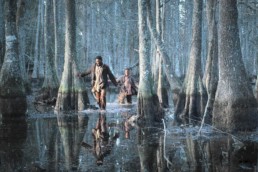Review: ‘The Retrieval’
Director Chris Eska is nominated for an Independent Spirit Award for this Civil War set, bounty hunter-budget film. The best part about Netflix’s selection of streamable movies is that it allows for obscure, micro-budget films to find an audience that would otherwise unknowingly opt for something more commercial. This Cinemacy Select, The Retrieval, is a prime example of this phenomenon. READ MORE...
The best part about Netflix’s selection of streamable movies is that it allows for obscure, micro-budget films to find an audience that would otherwise unknowingly opt for something more commercial. This Cinemacy Select, The Retrieval, is a prime example of this phenomenon.
In an unspecified American South location in 1864, Will (Ashton Sanders), a free black child no older than 12, works with his Uncle Marcus (Keston John) to help a group of bounty hunters catch runaway slaves. Immediately, the staged moral conflict is immensely high since Will uses his race to catch the slaves, not by choice but with the hope of earning a decent living. Will and his uncle are assigned to hunt an especially dangerous runaway slave and lure him back under the false pretense that his brother is sick and needs his help. It doesn’t take them long to find the runaway, Nate (Tishuan Scott), but bringing him back without him catching on to their real objective is a much longer journey.
As their journey continues, Nate and Will form a father-son type bond as they learn to trust each other. This relationship puts Will in a morally impossible situation since the bounty hunters promise that if he doesn’t bring Nate back, they will kill him. Young actor Ashton Sanders carries most of the film in what he doesn’t say, and as the audience we see how much guilt he is internalizing. This internal conflict is much more fascinating than a typical slavery or Civil War film because it is about someone outside the system still being oppressed by it, and unlike Marcus, who attempts to justify their behavior, Will is young enough to not be corrupted.
Considering this is such a small movie, the fact that it can stand shoulder to shoulder with much grander period dramas is an accomplishment on its own.
The film’s scale is incredibly intimate, focusing mainly on the protagonists’ conversations, and with just a few action sequences and subplots added into the mix. At times, the dialogue is a little direct, and characters expose themselves in a way that feels more written than authentic. That being said, the characters are developed well enough that their performances transcend the dialogue, and we believe them based on how well they are conveyed. Considering this is such a small movie, the fact that it can stand shoulder to shoulder with much grander period dramas is an accomplishment on its own. The last thing I will say is that because of the well established ticking clock that Will and Marcus are bound by in bringing Nate back, there is a continuous sense of doom and suspense on the journey to the inevitable climax that makes even the film’s smallest moments completely engaging.
It may not interest everyone, but the film’s path to release makes watching it all the more compelling. First, the film’s budget is minuscule, especially when compared to any other Civil War film that you’ve seen, yet it makes the absolute most of what it has. After debuting at South by Southwest in 2013, the film saw a tiny theatrical release but still managed to get recognized by the Independent Spirit Awards (announced earlier this week) with the “Someone to Watch Award,” given to a filmmaker whose work shows great promise. If writer/director Chris Eska can pull off the same intrigue and intimacy with a larger budget and a more nuanced script, then the future of cinema is definitely in good hands. The Retrieval is now available to stream on Netflix.
H. Nelson Tracey
Nelson is a film director and editor from Denver based in Los Angeles. In addition to writing for Cinemacy, he has worked on multiple high profile documentaries and curates the YouTube channel "Hint of Film." You can check out more of his work at his website, hnelsontracey.com


